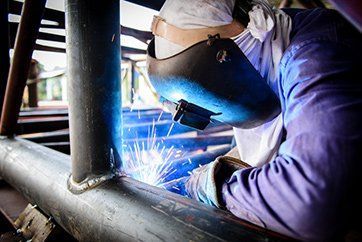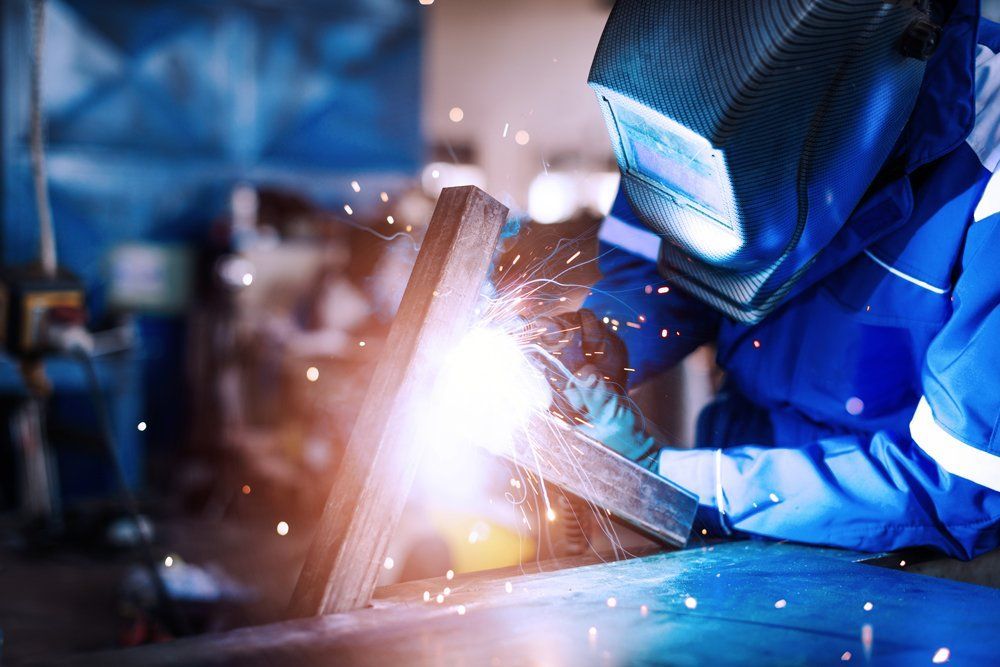The Importance of Pre-Treatment in Welding

Welding holds the distinction of being one of the most effective means of joining pieces of metal together. Virtually every aspect of modern industry - including cars, planes, and home appliances - owes a debt of gratitude to the power of welding. Yet not all welds can be trusted to the same extent. If welding is not completed under careful conditions, a weld may end up much weaker than desired. One of the most important ways that metal workers ensure a high-quality weld involves what is known as pre-treatment. This involves preparing the metal so that it will be as receptive as possible to the weld. This article will introduce you to the importance of welding pre-treatment.
Pre-Treatment as a Safety Measure Starting off with pre-treated metal promotes the strongest possible bond between the metal and the weld material. Pre-treatment involves the removal of any impurities from the surface of the metal. This includes things like oil, dirt, and grime. This cleaning also extends to substances such as rust, corrosion, and any coatings that may have been added by the metal manufacturer. If left in place, any surface impurities will act to reduce the effectiveness of the weld. This will make it more susceptible to cracking, breaking, or otherwise failing if placed under too much stress. As you can imagine, weld failure represents a serious - and potentially deadly - threat. For that reason, do everything possible to make a strong weld.
Pre-Treatment for Economic Efficiency While safety concerns represent the most important reason to pre-treat metal prior to welding, they aren't the only concerns. Pre-treatment also allows the fabricator to save money. A defective weld from dirty metal stands a much greater chance of failing its quality control testing. This will require that the fabricator either scrap the part or go to the trouble of disassembling, cleaning, and then re-welding the metal in question. Sometimes a bad weld will sneak past quality control, only to be spotted by the client. This can have an adverse effect on the relationship between fabricator and client. Bad welds may ultimately cost the welder work.
Pre-Treatment for Steel When working with steel - perhaps the most commonly welded form of metal - a fabricator generally begins by cleaning the metal with cloth and solvent. This acts to remove any oil and dirt. Acetone and lacquer thinners are two of the most common solvents used. Next, the fabricator will move on to more stubborn physical impurities such as mill scale, slag, and rust. If the metal has been coated to prevent oxidation, the coating must also be physically removed. The tool used here will depend on the severity or thickness of the build-up or coating. Sandpaper, wire brushes, and angle grinders are all suitable options for removing impurities.
Pre-Treatment for Aluminum Aluminum pre-treatment tends to be somewhat more involved than that of steel. This stems from the fact that aluminum inherently poses a greater welding difficulty. One reason for this has to do with the greater thermal conductivity of aluminum. Any impurities present on the surface will make it even harder to ensure proper fusion between the weld and the aluminum. Aluminum must first be carefully cleaned with non-chlorinated solvents to remove dirt and grease. A fabricator will clean the joint using a stainless steel wire brush. Grinders are not considered suitable for pre-treating aluminum because they may leave tiny pieces of their grinding material behind on the aluminum.
Welding Experts A good welder possesses a thorough knowledge of the entire welding process. Contrary to many people's understanding, the welding process begins long before anybody reaches for a welding torch. Proper pretreatment can make all the difference in the ultimate strength of a weld. For more information, please don't hesitate to contact the pros at Sam's Welding, Inc.
contact information
Phone: (619) 281-2709
Address: 4821 UNIVERSITY AVE STE B San Diego, California 92105
Serving The San Diego County: San Diego | El Cajon | La Mesa | Santee
License numbers:
#804664
Business Hours:
- Mon - Fri
- -
- Saturday
- -
- Sunday
- Closed
Emergency Services Available and Walk-ins Welcome





visit our location
Proudly Serving: San Diego, San Diego Metro, Chula Vista, La Jolla, Carmel Valley, Rancho Santa Fe, Fairbanks Ranch, Mira Mesa, Carmel Mountain, Rancho Bernardo, Rancho Penasquitos, Escondido, La Mesa, Spring Valley, Coronado, Point Loma, Bonita, El Cajon, Oceanside, Carlsbad, Solana Beach, & Del Mar.

